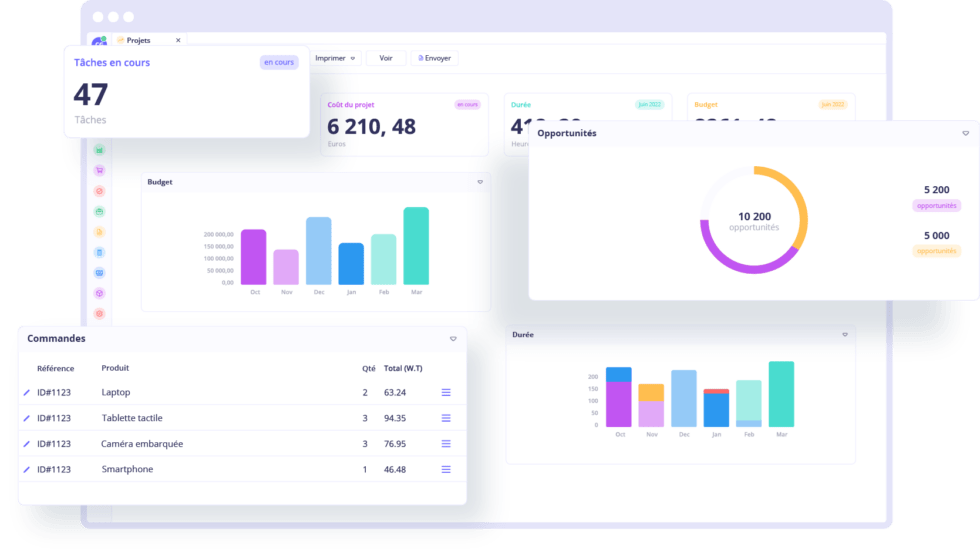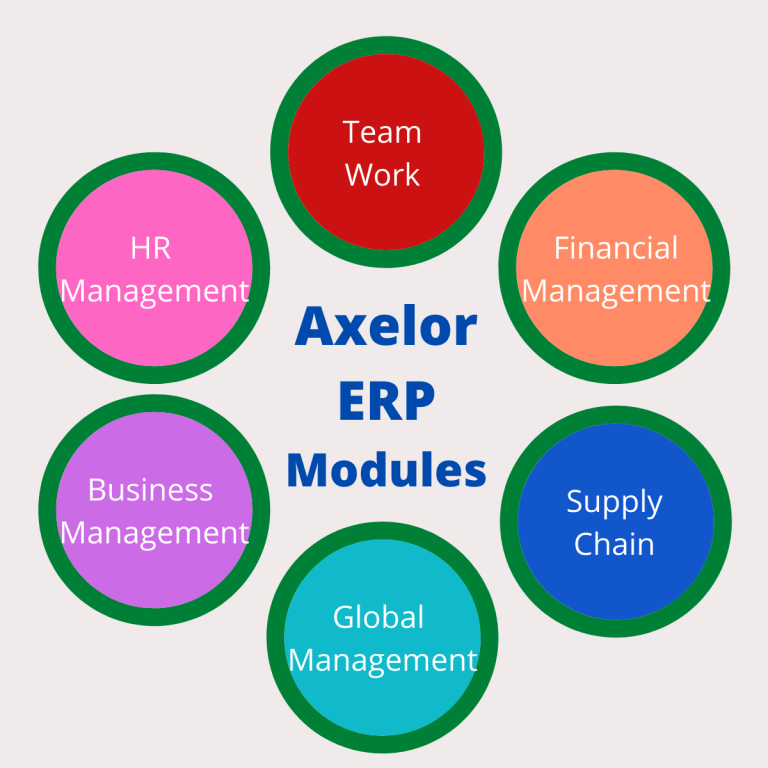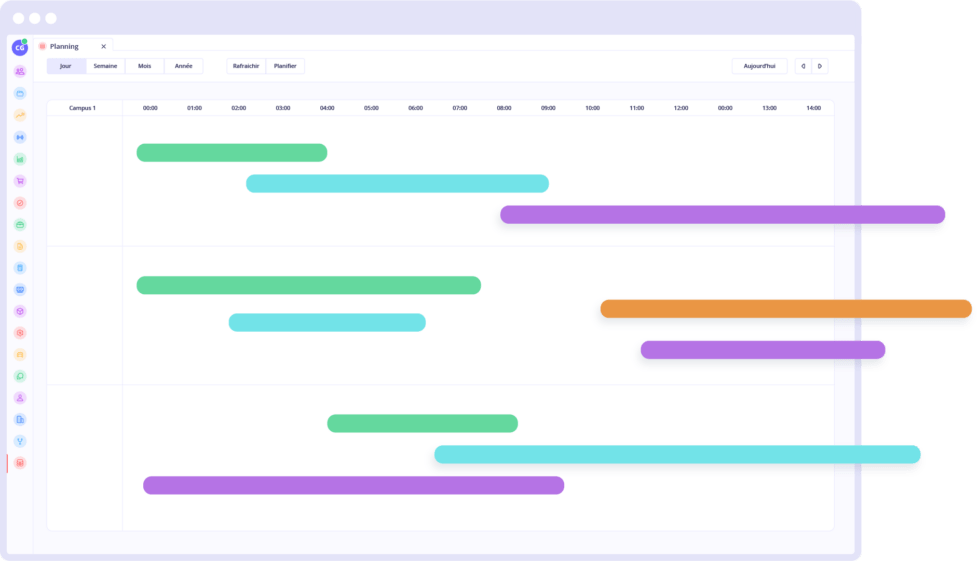axelor erp sets the stage for this enthralling narrative, offering readers a glimpse into a story that is rich in detail and brimming with originality from the outset. As a comprehensive business management solution, Axelor ERP encompasses an array of features designed to streamline operations, enhance productivity, and ultimately drive growth. This platform not only offers robust functionalities but also presents significant advantages for businesses looking to optimize their processes and performance.
Overview of Axelor ERP

Axelor ERP is an integrated enterprise resource planning solution designed to streamline various business processes. It offers a comprehensive suite of applications that cater to the diverse needs of organizations, promoting efficiency and productivity across different functions. With a modular architecture, Axelor ERP allows businesses to tailor solutions according to their specific requirements.Axelor ERP encompasses a wide array of features and functionalities aimed at facilitating effective management of business operations.
Key areas such as finance, human resources, sales, inventory, and project management are well-integrated, enabling seamless data flow and real-time insights. The software is built on a low-code platform, which empowers users to customize applications without extensive programming knowledge, fostering adaptability in a rapidly changing business environment.
For asthma patients, adopting environmentally friendly pest control methods is essential to minimize exposure to harmful chemicals. Such approaches prioritize the health of individuals while effectively managing pest issues. By utilizing natural pest deterrents, families can create a safer living environment that supports respiratory health and overall well-being.
Main Features and Functionalities
Axelor ERP is distinguished by its robust set of features, which include:
- Modular Design: Businesses can implement only the modules they need, such as CRM, ERP, or HRM, allowing for scalability and flexibility.
- Real-time Data Access: Users can access data and insights in real-time, enabling informed decision-making and prompt responses to market changes.
- Customizable Dashboards: The platform provides personalized dashboards, enabling users to view key performance indicators that matter most to them at a glance.
- Integrated Workflows: Streamlined workflows across departments enhance collaboration and improve overall operational efficiency.
- Low-code Development: Users can create and modify applications with minimal coding, making it accessible for non-technical personnel.
The advantages of utilizing Axelor ERP extend beyond its feature set. By providing businesses with tools to centralize their operations, Axelor ERP enhances overall productivity. It reduces operational costs through improved resource management and minimizes the risk of errors associated with manual processes. Furthermore, it fosters better collaboration among teams, thus creating a more cohesive work environment.
Advantages of Using Axelor ERP for Businesses
The implementation of Axelor ERP offers numerous advantages that significantly benefit organizations across various sectors:
- Cost-Effectiveness: Its modular approach allows businesses to invest only in necessary functionalities, optimizing costs while ensuring required capabilities are in place.
- Enhanced Efficiency: Automated processes reduce manual workload, allowing employees to focus on higher-value tasks that enhance productivity.
- Scalability: As businesses grow, Axelor ERP can easily adapt to new processes and requirements without necessitating a complete system overhaul.
- Improved Decision-Making: Access to real-time data analytics equips management with insights needed to make strategic business decisions promptly.
- Collaboration and Communication: Integrated modules ensure that all departments have access to the same information, fostering better communication and collaboration.
“Axelor ERP transforms the way businesses operate by integrating all key processes into a unified platform, empowering organizations to become more agile and responsive to market demands.”
Implementation Process of Axelor ERP
Implementing Axelor ERP is a comprehensive process that requires careful planning, execution, and monitoring. The success of this implementation can significantly influence an organization’s operational efficiency and effectiveness. This segment Artikels the steps involved in the implementation process, best practices for ensuring success, and common challenges that organizations may face with suggested solutions.
Steps in Implementing Axelor ERP
The implementation of Axelor ERP typically follows a systematic approach to ensure all critical aspects of the business are considered. The steps are as follows:
- Planning and Preparation: This initial phase involves defining the scope of the project, identifying key stakeholders, and setting clear objectives for what the organization aims to achieve with Axelor ERP.
- Requirement Analysis: Engage with various departments to gather and document their specific needs. This step is crucial for tailoring the ERP functionalities to align with business processes.
- System Design: Based on the requirements gathered, design the system architecture and workflows. This phase may include customizing modules and defining user roles and permissions.
- Data Migration: Plan and execute the migration of existing data into the new ERP system, ensuring data integrity and accuracy. This may involve cleaning and transforming data from legacy systems.
- Testing: Conduct rigorous testing to validate that the system functions as intended. This includes unit testing, integration testing, and user acceptance testing.
- Training: Implement a training program for end-users to familiarize them with the new system. Proper training is essential for maximizing user adoption and minimizing resistance.
- Go-Live: Officially deploy the Axelor ERP system for use within the organization. Monitor the system closely to address any issues that may arise during the transition.
- Post-Implementation Support: Provide ongoing support and maintenance. Regular updates and user feedback are important for continuous improvement.
Best Practices for Successful Implementation
Following best practices can enhance the likelihood of a successful Axelor ERP implementation. Consider the following key practices:
Effective communication and stakeholder engagement are vital to ensure everyone is aligned with the project goals.
- Involve Stakeholders Early: Engaging users from various departments early in the process helps to foster buy-in and collect diverse perspectives on system requirements.
- Define Clear Objectives: Establish specific, measurable goals that the implementation aims to achieve, which can guide the project and measure success.
- Allocate Adequate Resources: Ensure that financial and human resources are sufficiently allocated to meet the demands of the implementation timeline.
- Continuous Communication: Maintain ongoing dialogue with all stakeholders throughout the implementation process to address concerns and provide updates.
- Prioritize User Training: Invest time in comprehensive training sessions to empower users and reduce resistance toward the new system.
Common Challenges and Solutions
Organizations may encounter several challenges during the implementation of Axelor ERP. Recognizing these challenges and having strategies to overcome them is essential.
Proactive problem-solving can mitigate risks and enhance the implementation experience.
When considering pest control solutions, it’s important to choose options that are safe for both pets and family members. Implementing eco-friendly pest control ensures that your home remains free from pests while protecting the health of your beloved animals. These humane methods provide effective results without compromising the safety of your loved ones.
- Resistance to Change: Users may be hesitant to adapt to new systems. To overcome this, implement change management strategies that highlight the benefits of the new ERP.
- Data Migration Issues: Inaccurate or incomplete data migration can lead to significant problems. Conduct thorough data audits and validation processes prior to migration.
- Insufficient Training: A lack of understanding of the system can hinder productivity. Ensure that training is ongoing and tailored to different user groups.
- Scope Creep: Projects can expand beyond initial plans, leading to delays. Define and adhere to project scope while managing any changes through a formal process.
- Technical Challenges: Integration with existing systems may pose difficulties. Work closely with technical teams to ensure compatibility and address issues promptly.
Customization and Integration of Axelor ERP

Axelor ERP stands out not only for its functionality but also for its flexibility in customization and integration. These aspects are vital for businesses seeking to tailor the software to meet specific operational needs and enhance overall productivity. The ability to customize and seamlessly integrate with other systems ensures that organizations can maximize the potential benefits of the Axelor ERP platform.
Customization Options Available in Axelor ERP
Axelor ERP offers a robust suite of customization options that allow organizations to adapt the software to their unique workflows and processes. This customization capability is essential for aligning the ERP system with specific business requirements. Some of the key customization features include:
- Modular Architecture: Axelor ERP is built on a modular framework, allowing businesses to select and implement only the modules that they require, such as finance, HR, inventory, or sales.
- User Interface Personalization: Users can customize dashboards, reports, and forms tailored to individual roles or departments, enhancing usability and accessibility.
- Business Rules and Workflows: The software allows users to define business rules and automate workflows, ensuring processes align with organizational policies and practices.
- Custom Fields and Entities: Users can create custom fields and entities to capture specific data points that are relevant to their operations, facilitating detailed reporting and analysis.
Integration with Other Business Systems, Axelor erp
Axelor ERP’s integration capabilities enable it to connect with various business systems and applications, creating a cohesive ecosystem that enhances data flow and operational efficiency. Integrating Axelor ERP with other systems can streamline processes, reduce manual data entry, and improve decision-making. Notable examples of integration options include:
- CRM Systems: Integrating Axelor ERP with Customer Relationship Management (CRM) systems such as Salesforce or HubSpot allows for synchronized customer data, leading to improved customer service and engagement.
- eCommerce Platforms: Connection with eCommerce platforms like Magento or Shopify enables real-time updates of inventory and sales data, facilitating better inventory management and order processing.
- Payment Gateways: Integration with payment gateways such as PayPal or Stripe ensures streamlined transaction processing, allowing businesses to manage financial operations more efficiently.
- Third-party APIs: Axelor ERP can connect with various third-party applications through APIs, enabling customized solutions for specific business needs and enhancing overall functionality.
Importance of Customization and Integration
The significance of customization and integration in Axelor ERP cannot be overstated. Customized solutions allow organizations to leverage unique business processes and enhance user adoption, as employees are more likely to embrace a system that reflects their specific workflow. Furthermore, effective integration with other systems ensures a seamless flow of information across different departments, leading to improved collaboration and faster decision-making.
“Customization and integration are not just enhancements; they are essential for maximizing the full potential of Axelor ERP, driving efficiency, and achieving business objectives.”
Use Cases and Success Stories of Axelor ERP

The implementation of Axelor ERP has transformed numerous businesses across various sectors by streamlining operations, enhancing productivity, and driving growth. This segment showcases real-world examples of successful Axelor ERP implementations, highlighting the key factors that contributed to their success and the measurable outcomes achieved post-implementation.
Successful Implementations in Diverse Industries
Multiple organizations have adopted Axelor ERP with remarkable results, illustrating its versatility and effectiveness. Below are examples that underscore the impact of Axelor ERP across different industries:
- Manufacturing Sector: A mid-sized manufacturing firm integrated Axelor ERP to optimize its supply chain and production processes. The company experienced a 30% reduction in production delays, significantly improving overall efficiency. By automating inventory management and production scheduling, the firm was able to reduce operational costs by 15%.
- Retail Industry: A retail chain adopted Axelor ERP to unify its sales, inventory, and customer relationship management. Post-implementation, the organization witnessed a 40% increase in sales due to enhanced customer insights and streamlined operations, allowing for more effective promotional strategies and inventory management.
- Service Industry: A consulting firm utilized Axelor ERP to manage project workflows and client relationships. This resulted in a 50% improvement in project delivery timelines and an increase in client satisfaction ratings by 25%. The ability to track project progress in real-time empowered the team to respond swiftly to client needs.
Key factors that contributed to the success of these implementations include:
“Effective stakeholder engagement and comprehensive training programs were essential to harnessing the full potential of Axelor ERP.”
The measurable outcomes experienced by these organizations post-implementation are indicative of Axelor ERP’s ability to drive significant business improvements. These include:
- Reduction of operational costs by an average of 20% across various sectors.
- Enhanced data visibility leading to informed decision-making and strategic planning.
- Increased operational efficiency, with many companies reporting time savings of up to 50% in key processes.
The successful application of Axelor ERP across these diverse industries is a testament to its adaptability and effectiveness in meeting varying business needs, ultimately leading to sustainable growth and improved performance.